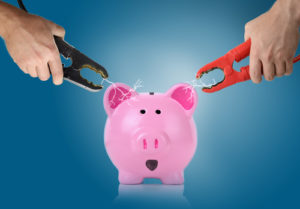Special to the Financial Independence Hub
Most millennials aren’t taught personal finance beyond the few who soaked up “lessons” from having an allowance or chores while growing up. Given the increasing use of digital currency, from tapping phones together to send money, depending on Venmo and utilizing bitcoins, ask a millennial how to write a check or balance a bank account and few can give a succinct answer: but does that even matter? Has personal finance changed so much in the past few decades that its definition is due for an overhaul?
Financial literacy and well-being is and always will be vital. How it’s defined and its best practices evolve as we do. Just like any type of “health,” financial health requires setting a strong foundation, teaching and practice. It’s strange that we have an entire generation in full-fledged adult categories without a clue of how to handle their finances.
Consider this the starter kit for millennials:
1.) Credit score management
The importance of credit scores isn’t going anywhere. In fact, they’re more important than ever with some employers using credit scores to narrow down job candidates. Make sure to monitor your credit score, check your credit report regularly for errors, and make your payments on time. This will help ensure you maintain a healthy score. There are other ways improve your credit score that you might not know, too, such as snagging a tradeline where you’re added onto a person’s credit account who already has a solid score. A tradeline company can manage this, linking paying customers to a tradeline account so any messiness of blending finances with personal relationships is avoided.
2.) Buffering that nest egg
Having at least three months’ worth of living expenses in “liquid cash” that’s easily accessible is a reasonable starting point. Some financial experts recommend one year, but a year’s salary can sound very overwhelming. Start socking away funds in an emergency account by using an app that rounds up purchases and siphons funds to this account so you don’t even notice.
3.) If possible, entrepreneurs and business owners should seek out life in specific states or overseas
Millennials are the generation of entrepreneurs, and this makes personal finance even stickier. Where you live plays a huge role in your ability to build wealth. Obviously some regions have higher costs of living than others, but every state also has a different income tax. There are seven states, including highly desirable ones like Florida, that boast a zero per cent income tax rate. Moving abroad often allows for foreign earned income exemption in which you don’t pay any state income tax (of course) but also no federal taxes except social security and Medicare.
4.) Budget, budget, budget
You know you “should budget,” but what does that mean? Everyone should have an active way to track every penny earned and spent. Whether you do this via an app or website, old-school Excel spreadsheet or another strategy that works for you doesn’t matter. What does matter is ensuring you choose a method you’ll actually use. It’s the best way to see where you can cut costs. If you don’t really know how much you’re spending (or earning!), how are you going to “manage” that money?
 5.) Make your money work for you
5.) Make your money work for you
Any savvy investor will tell you it’s not enough to simply make money, you have to make that money work for you. This requires seeking out investments that are reasonable for your preferred risks (such as a high-yield savings account versus a money market account), looking for credit cards with a rewards program that makes sense for your goals and spending habits, and continuously reassessing your goals and where you are to maximize your money’s work. Taking with a financial advisor is a good first step. These professionals offer consultations for free in exchange for a percentage of the money earned for your investments.
6.) Shift your cognitive conditioning
Your cognitive thinking includes thoughts, habits and fluid characteristics that are developed thanks to years of practice: for better or worse. How you think about money dictates how you treat money. It takes conscious effort and changing your bad habits over time to develop new habits. This is a critical step for all parts of daily living, from choosing to buy that daily coffee at the shop or make it at home to how kindly (or not) you speak to yourself.
As you budget, consider creative ways to save money and how you’ll change existing habits to nurture new ones. For example, if you know you’ll be really tempted to get that expensive coffee because you drive a certain route every day and will see your favorite shop, change routes. Carve out time in your morning to start a new coffee ritual at home that will make it seem like a treat.
7.) Surround yourself with motivating, inspiring people
Everyone has different friends and acquaintances that serve various roles in life. Some of these people might have financial habits that are admirable, while others might feed your habits of poor spending. Make it known to those closest to you that you’re working on bettering your financial habits—kind of like it’s important to tell people when you’ve adopted a healthier diet or workout regimen. You’ll be able to assess who your cheerleaders are, and you’ll also find out who’s not supportive. Surround yourself with those who support you and/or have their own financial habits you’d like to strive towards. It will make a huge difference.
8.) Use the ladder approach for goal setting
It can be very intimidating to set a massive goal (like buying a home) when you’re just learning how to create a working budget. Instead, create a series of steps or mini-goals that will ultimately help you get to your bigger goal. These goals should be attainable on daily, weekly, monthly and quarterly bases. Not only are they bound to be more achievable and offer instant gratification (a trait humans naturally love), but they’ll also keep you motivated to keep working towards the bigger goals.
9.) Utilize the cash method to get started
It’s easier than ever to spend thanks to numerous platforms from bitcoin to sending money to friends and family via PayPal. However, studies have shown many people think of paper cash as more valuable than electronic transfers. If you struggle with overspending, set a cash amount that you’re allowed weekly for extras. Once that money’s gone, it’s gone until the following week. It’s a starter way to learn the value of a dollar and can help keep overspending in check.
It’s never too early (or late) to improve your financial practices. Almost everyone can benefit from a more conscientious approach to personal finance. Determine your biggest challenges first. For many millennials, this includes poor spending habits, a lack of savings and investments, and not knowing how long-term financial planning works. Retirement and supporting yourself in your golden years is incredibly expensive and challenging. Given the current state of supplementary systems such as Social Security, it’s more important than ever to improve personal finance and money management.
 Trevor McDonald is a freelance writer who focuses on health, wellness, and finance. He enjoys using his talent for words to help educate others. In his free time, you can find him writing for different publications or outside enjoying about any type of fitness activity imaginable. Linkedin: https://www.linkedin.com/in/
Trevor McDonald is a freelance writer who focuses on health, wellness, and finance. He enjoys using his talent for words to help educate others. In his free time, you can find him writing for different publications or outside enjoying about any type of fitness activity imaginable. Linkedin: https://www.linkedin.com/in/
Email: trevorc.mcdonald@gmail.com



Very interesting insight. I believe in professionals so this is a very useful article for everyone. Thank you very much for sharing..